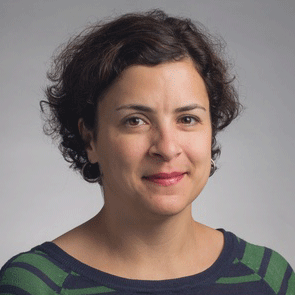Giovana Girardi
Knight Science Journalism Fellow, ’14-15

Giovana Girardi is a science and environmental reporter from O Estado de S. Paulo, one of the biggest newspapers in Brazil. She has been working on science issues for about 13 years. More recently, she has been focusing on climate change research, on the diplomatic negotiations surrounding a new global agreement to curb greenhouse gas emissions, on biodiversity and humans interactions with it, and and also writing about environmental issues in cities.
What has been the focus of your research during your Fellowship? Why is this topic/issue/cause important to you and for the public?
I chose an eclectic set of courses for the first semester, which reflect the variety of subjects that I used to cover in Brazil. At MIT and Harvard, I have attended courses on biology, evolution, and global health. But the course I have been most engaged with is “Science, Politics, and Environmental Policies,” in Urban Studies and Planning. Over the last few years I've been following climate change research as well as the negotiations surrounding a new global agreement to curb greenhouse gas emissions.
One of my goals in applying to the Knight Science Journalism fellowship program was to better understand why a proper response to climate change is still so far away. My plan was to dig deeper into the science and politics behind this issue in order to be able to communicate these subjects in a more effective way. I took a class about Science and Politics, taught by Susan Solomon, the Ellen Swallow Richards Professor of Atmospheric Chemistry & Climate Science, and interviewed researchers who work on the MIT Joint Program on the Science and Policy of Global Change as well as those working on the Project on International Climate Agreements at the Harvard Kennedy School.
What I learned is that a political solution for the problem is even more complicated than I thought, and that, maybe, my view on the whole process was naïve.
“We all will be affected on some level by climate change. But I am afraid that journalists have been losing relevance in this area, and we need new strategies to communicate the importance of this dramatic issue. One big step in that direction is to understand the science and the politics of climate change better.”
Does the practice of science journalism differ in Brazil from the U.S. or is it similar? Tell us a little about the similarities and distinctions, if any.
I guess in both countries science journalists face a hard reality, with the loss of jobs and lack of space in newspapers and magazines, which are reducing their sizes and cutting pages. We need to figure out how to tell science, health, technology, and environmental stories in the context of social media. But I think the similarities stop there. In Brazil, there is a bigger pressure to connect science journalism with the readers’ lives. The science stories need, in many cases, to be practical, with a clear personal impact. It is more difficult to find space to talk about abstract things, or things that seem far away from readers but are still very important.
Public understanding of scientific issues, such as climate change and digital privacy, plays a key role in shaping state and federal policy. In what area do you think science journalism has the greatest public impact / influence?
I used to think that stories about climate change could have a strong impact on the public and in politics, because this is, at least for me, the most important subject of our era. We all will be affected on some level by climate change. But I am afraid that we journalists have been losing relevance in this area. I don’t know why that is, but I have the impression that either people are getting tired of hearing the same catastrophic news over and over, or they (specially American and South American readers) just don’t feel personally threatened. Either way, I think we need new strategies to communicate the importance of this dramatic issue. One big step in that direction is to understand the science and the politics of climate change better. That is one of my goals here.
Suggested Links
Knight Science Journalism website
MIT Science Writing Program website
An article by Giovana Girardi at Estado
Story prepared by MIT SHASS Communications
Editorial team: Emily Hiestand and Daniel Pritchard